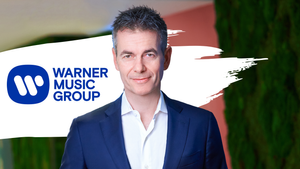Warner Music boss Robert Kyncl has provided more information about the major's plans to better capitalise on the superfan opportunity during a conversation at Web Summit Qatar. He also again claimed that the majors - with their scale and global reach - are best positioned to help artists capitalise on the next round of digital opportunities.
In a conversation with Bollywood star Nora Fatehi - who is newly signed to Warner - Kyncl said, "I firmly believe in the power of the superfan, [but] it hasn't really been figured out. So something we're working on at Warner are these direct-to-superfan experiences”.
“I've assembled a team of incredible technology talent”, he added, “who are working on an app where artists can connect directly with their superfans - who are generally the people that consume the most and spend the most - and we’re focused on making sure that artists get data on these superfans".
Both Kyncl and Universal Music CEO Lucian Grainge talked up the superfan opportunity in their start-of-the-year memos to staff. At the time Kyncl wrote, “We need to develop our direct artist-superfan products and experiences. Both artists and superfans want deeper relationships, and it’s an area that’s relatively untapped and under-monetised”.
The direct-to-fan opportunity isn't new. Plenty of artists have generated additional revenues by selling products and experiences directly to the core fanbase, sometimes working with their labels on that activity. However, whereas in the past direct-to-fan often meant selling physical products to fans via an online store, many artists are now seeing opportunities to generate new income by offering superfans extra digital content and experiences.
One dilemma is deciding whether it is best to offer that content and those experiences via an existing digital platform - say YouTube or Spotify - and, if so, which platform is best.
Kyncl reckons that his company can provide the best solution for artists seeking to capitalise on all this, including helping deal with that dilemma. That’s partly because Warner has relationships with most digital platforms, and also because of the new tech teams he has been recruiting since joining the major at the start of last year.
“Music is omnipresent, it's everywhere", he continued. "Artists want to work with every single platform, they don't want to optimise just for one platform over another. So a solution like this for superfans has to be a cross-platform solution”.
“We, as a record label, are in a perfect position to do that”, he reckoned, “because we work with all of the platforms. Historically, we haven't had the technology talent to do this, but now we do. It's an exciting piece of work that will launch later this year".
The benefit of having scale and reach is becoming a common theme when Kyncl talks about the role of major record companies.
Earlier this month he told his investors that by representing a large catalogue of popular music - as Warner does, even as the smallest of the three majors - it has "more collective bargaining power when dealing with complex existing and new distributors and technologies”.
That scale, he added yesterday, is also important for capitalising on the superfan opportunity and for simply standing out in such a competitive music marketplace.
“We have a global infrastructure, with marketing and promotions teams in many countries", he mused. "That’s what it takes to create a global star, if you want to do it on a sustained basis. You need to understand the ignition cities or countries, and how demand on the internet grows”.
Stressing that Warner can collect and analyse data from across its roster and all the digital platforms to inform every release marketing campaign, he added, "That’s something only a large music company can do because of the global resources that we have. And I'm excited to keep investing into this expanding global demand for content”.

